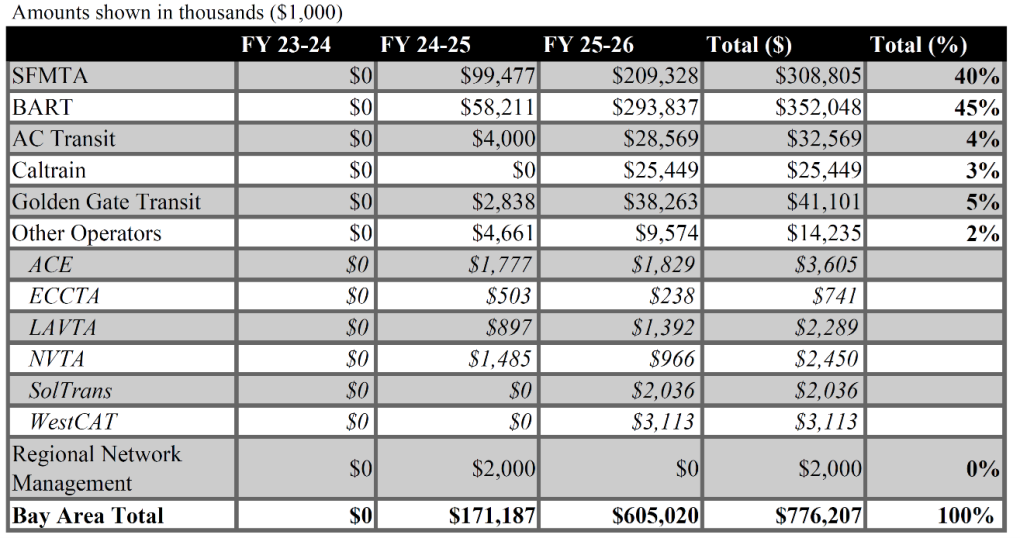MTC funding plan of state budget funds for transit operations bolsters regional coordination efforts
The Metropolitan Transportation Commission’s approval today of state budget funds and other regional funds for Bay Area transit agencies bolsters an ongoing regional coordination effort and provides essential stopgap operational funding for transit in the Bay Area. Today’s action is a culmination of hard work led by transit agencies and the MTC to advocate for operations funding to ensure continued transit service throughout the Bay Area.
MTC Commissioners approved a distribution framework for an anticipated $447M in state budget funds from Senate Bill 125 and approximately $300 million of regionally controlled funds to transit agencies while requiring that the agencies enhance the customer experience and improve internal efficiency.
Bay Area transit General Managers are meeting on a weekly basis to enhance coordination between agencies and improve connectivity. This transit network coordination work will require more funding to ensure agencies can continue to run reliable service while also focusing on new enhancements.
A key component in the decision to allocate these funds will be the continuing implementation of the Transit Transformation Action Plan, a comprehensive plan for better regional transit coordination and improved rider experience. It encompasses closer fare coordination such as the Clipper BayPass pilot, the expansion of Clipper START offering discounts for low income riders, free or discounted transfers between systems, aligning schedules so it’s easier for riders to make connections between agencies, and more understandable mapping and wayfinding with a uniformed approach to signs to help riders navigate their way through transit systems.
While state funds are vital to continue near-term operations, they fall short of the Bay Area’s funding needs beyond FY26. The MTC and the Bay Area transit agencies are studying options for additional revenues including a regional transportation measure in 2026.
MTC plans to revisit the estimated needs for all operators each year to program the following year’s funding. The proposed programming amounts for all operators across FY25 and FY26 are included in the table below.

Transit agency General Managers praise the new funding and support.
BART General Manager Bob Powers said, “This funding from the MTC supports BART’s new Safe and Clean Plan to welcome riders back to our system and it buys us time to explore a sustainable funding model while avoiding devasting service cuts. Our latest data shows our investments are paying off with great improvements in reliability and police presence. BART is also committed to continue working with all Bay Area transit agencies on transformational improvements that will improve service for transit dependent riders and make it easy for people to ditch their cars and take transit instead. We want to thank the Commission for their approval of these funds and their leadership throughout this process.”
SFMTA Director of Transportation Jeffrey Tumlin said: “This is very good news for the nearly half a million people who ride Muni every single day. It gives Bay Area transit agencies more time to recover from the impact of the pandemic, which changed commute patterns and is still taking an economic toll on downtown San Francisco. These funds will keep Muni financially stable for longer than we had expected provided that we don’t expand Muni service beyond current levels. We’d like to thank MTC, the state legislature and the governor for their actions to make this happen. We’re proud that despite our financial challenges, Muni service is safe, clean, fast, frequent and reliable -- and we plan to keep it that way.”
Caltrain Executive Director Michelle Bouchard said: “We are grateful to our state leaders for securing these funds and to MTC for the proposed FY26 allocation to Caltrain that will allow us to continue working with our regional partners to coordinate an easy and integrated experience for Bay Area transit riders. With the launch of electrified service next year, Caltrain will greatly improve our service and the rider experience. Electrification will mean up to 25 minutes in time savings on local trips and increase of service to all the stations, including half hour service during weekends and off-peak hours. The trains will have wi-fi, power outlets at every seat and new safety features. We are proud to keep working on a world-class, modern and climate friendly system that the region deserves.”
Golden Gate Bridge, Highway and Transportation District General Manager Denis Mulligan said: “We want to thank MTC, the state legislature, and the governor for their continued support of Bay Area transit. These funds are a much-needed shot in the arm that will help us provide first-class bus and ferry service for our customers into the future. We look forward to continued collaboration with our transit agency partners to roll out even more improvements for Bay Area riders.”